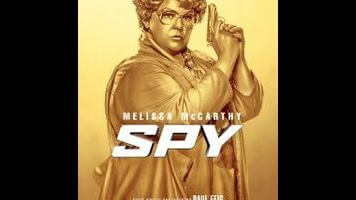Paul Feig and Melissa McCarthy may not make spoofs in the vein of the old Zucker-Abrahams-Zucker dynasty, but their developing cinematic partnership has built a playful relationship with well-worn genres. The Heat ran through the buddy-cop formula without exactly satirizing it, instead tweaking conventions to accommodate the rare female buddy duo. Spy, similarly, doesn’t exactly send up James Bond or Jason Bourne espionage thrillers, but it places McCarthy in the middle of the action while subverting the traditionally male domination of that arena.
McCarthy plays Susan Cooper, a CIA analyst with, as her boss (Allison Janney) puts it, a “certain tame demeanor.” She’s a capable office drone in a field that values the manly slickness of Bradley Fine (Jude Law), her unofficial partner and clear Bond analogue save for his American accent (presumably Law’s voice is flattened to balance out a Brit-heavy cast). The movie opens with a sequence that pulls back the curtain on pumped-up spy-craft, revealing that behind every suave, ass-kicking secret agent is a desk jockey (in this movie, usually female) whispering instructions, warnings, and notes about his allergy medicine into his earpiece. Spy’s CIA isn’t necessarily more realistic than depictions in any other pieces of big-studio escapism, but the film cleverly melds the sensibilities of glossy thrillers with a sitcom version of office banality. Fine saves the day, and Susan gets little credit while pining for his muscular handsomeness and fighting the assumption that she must own multiple cats.
But when a leak compromises the identities of the agency’s all-star roster of badasses, including Fine and hotheaded bruiser Rick Ford (Jason Statham), Susan nervously volunteers to enter the field and track down a missing nuclear bomb by trailing the nefarious Rayna Boyanov (Rose Byrne). Soon she’s embroiled in a country-hopping, costume-changing adventure—one that, like The Heat, toys with its own dopey genre constraints while managing to treat McCarthy’s character with some manner of dignity, even when the actress continues to demonstrate that she’ll commit to any bit for a laugh.
McCarthy has been accused of playing the same character repeatedly, but that’s not really the case in her films with Feig. (Even in her lesser leading roles for other filmmakers, she doesn’t play the same person so much as a consistently erratic, sometimes incoherent mix of her various talents: slapstick, elaborate threats, playing dumb.) The unassuming, unassertive Susan isn’t much like the brusque fighter of The Heat or glorious weirdo she played in Bridesmaids; if anything, it’s Statham who does some McCarthy-style shtick in the early going by spouting off profane tangents about his implausible past feats of strength or fortitude. (And he’s a riot, kidding his Crank/Expendables persona with bravado). McCarthy cedes him a surprising number of laughs until Susan finds her footing and starts incorporating some familiar aspects of McCarthy’s past work; when she finally unleashes a vicious insult, it’s like a Will Ferrell character finally indulging in a panicked outburst. But McCarthy plays a variety of notes with more coherence than she did in Tammy; the actress is by turns shy, frustrated, aggressive, and eventually a scrappy action dynamo. She gives an impressively multifaceted performance that somehow avoids leaning on Susan’s various outlandish disguises for its biggest laughs.
Those laughs aren’t delivered in a nonstop barrage; Feig hews too closely to his genre checkpoints for the movie to explode into Adam McKay-style genius. Feig’s directing skills are, if anything, under-appreciated—Spy has plenty of decent sight gags—but here he sometimes slows down the movie with reactions that repeat or narrate jokes, perhaps trying to make sure they’re heard above the busy din of action. Protracted scene-setting and various plot twists help push the movie to the two-hour mark without providing the kind of extended nutty asides that can be a major benefit of the improv-heavy comic style. McCarthy, Statham, and Byrne all have killer moments—the latter sketches her villain with such acute expressions of withering derision that she can get a laugh with as little as a gesture—but Feig’s script too frequently shuffles its many characters in and out of the action. By the final third, the plot depends largely on various members of the cast popping up, disappearing, then popping up again.
But if the ensemble doesn’t fully gel as such, that’s because Spy isn’t a buddy comedy, no matter how well Statham, Byrne, and others pair with the star. Though Susan isn’t as arrogant as her male counterparts, she’s intended to be as singular a force, in her own way, as Bond, Bourne, or Jason Statham, and Feig does McCarthy the service of not weighing down the empowerment with extraneous lectures about teamwork or a time-consuming love story. If the movie goes a little easy on the very idea of a righteously ass-kicking CIA, it’s probably because Feig and McCarthy aren’t, at their core, satirists. At their best, they use genre tropes in service of characters better than those in many actual genre films. Rare is the broad mainstream comedy that can goof on its bigger-budget Hollywood siblings while providing a few moments of sincere uplift.


 Keep scrolling for more great stories from A.V. Club.
Keep scrolling for more great stories from A.V. Club.